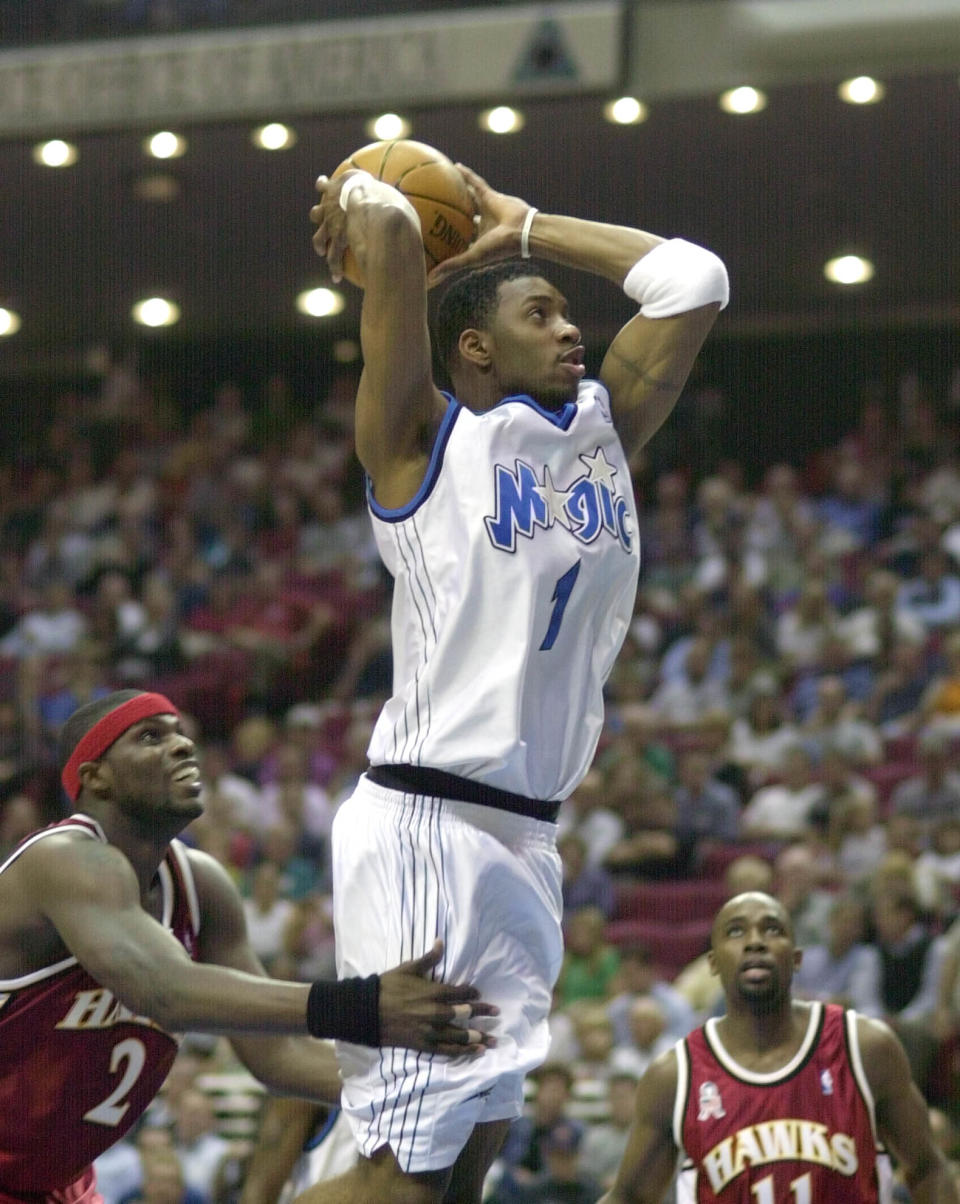Tracy McGrady: Ahead of his time, yet a victim of poor timing

During his Hall of Fame career, Tracy McGrady fell into the lame NBA nickname tradition of having his name lazily reduced to an initial and a condensed last name. But for some reason “T-Mac” really served its purpose. It gave the impression that McGrady was some futuristic, position-less, droopy-eyed superhero created by engineering geeks and sent back in time to save the league from its tired, traditional norms. T-Mac could score 13 points in 33 seconds. T-Mac could hurdle Shawn Bradley and destroy rims. T-Mac could make scoring 62 points look like an afternoon stroll.
T-Mac played with power and grace. He flaunted skill and finesse. T-Mac was never the best but spent the early part of this century forcing himself into that conversation. T-Mac couldn’t be boxed in because he checked so many boxes as a versatile playmaker and scorer. He had a power forward’s body with a point guard’s handle and every available weapon in his offensive bag as a shooting guard.
[Now’s the time to sign up for Fantasy Basketball! Join for free]
“I knew I was drafting a player that had a chance to be exceptional in the NBA,” said Isiah Thomas, who plucked McGrady out of high school for the Toronto Raptors in 1997 before Kevin Garnett and Kobe Bryant had fully established themselves and made such a selection appear to be anything except risky. “I knew McGrady had the skill set to make the leap. Tracy really could do it all. He could pass, he could shoot, but he was a willing passer. He wasn’t a passer looking to fill the stat sheet, although he did fill the stat sheet with his play. He played the game in a very unselfish way.”
Given how the game has evolved, with All-Star alliances being all the rage and teams no longer committed to clichéd five-man units, T-Mac was ahead of his time. Unfortunately for McGrady, the reason he left the game with no tangible team success is because he was also a victim of poor timing.
Ten years before LeBron James, Dwyane Wade and Chris Bosh made player-crafted super teams the desired path to championships, McGrady attempted to form a free-agent powerhouse in Orlando with Grant Hill and Tim Duncan. Duncan, however, stayed in San Antonio, denying the league an Eastern Conference antidote for the Shaquille O’Neal-Kobe Bryant Los Angeles Lakers dynasty.
McGrady left his cousin, Vince Carter, in Toronto in 2000, just as the legend of Vinsanity was rising. He teamed up with Hill only after Hill broke his ankle. Hill could never stay healthy in Orlando, and McGrady forced his way out in 2004, right after the franchise drafted Dwight Howard. McGrady landed in Houston with Hall of Famer Yao Ming just as leg and knee injuries would ruin China’s greatest basketball export. So McGrady essentially traded in the most durable years of Howard’s career for Yao’s most fragile. He exhausted every amount of talent until his own body broke down, leaving T-Mac with one of the more complicated basketball legacies.

McGrady will be inducted into the Naismith Memorial Basketball Hall of Fame on Friday, along with the late Jerry Krause, architect of the Chicago Bulls dynasty; Kansas coach Bill Self; and former ABA legend George McGinnis. But McGrady’s selection was met with some resistance and criticism, especially from the Ringz Police, an annoying echo chamber of haters who oversimplify an individual player’s value by judging how much diamond-encrusted jewelry he acquired as a member of a team.
No, McGrady didn’t win. Not even a little bit. But the selection committee clearly saw through what his teams lacked and wouldn’t deny what their eyes – and the numbers – revealed about his individual gifts. From 1999-2008 – when Peak T-Macness had been attained – McGrady made seven All-Star teams, seven All-NBA teams, won back-to-back scoring titles (in 2003 and 2004) and twice finished in the top four in MVP voting.
McGrady also made seven postseason appearances during that peak period, losing in the first round each time despite averaging 28.5 points. Though he was tagged with an unfair reputation for failing to show up when it counted, McGrady raised his scoring average from the regular season six times. The only time he didn’t improve his scoring output was in 2003, the first time the NBA extended the first round to seven-game series – something that was lost on McGrady at the time – and posting 31.7 points wasn’t enough to lift the Orlando Magic past the Detroit Pistons. McGrady was often a virtuoso, rolling solo. If anything, he erred in trying to do too much.
The first time his team won a playoff series, in 2009, McGrady was sidelined with microfracture surgery on his left knee. The only time he made the NBA Finals, in 2013, he was so far at the end of the San Antonio Spurs’ bench that file photos might be the only evidence of where he finished his career. But McGrady deserves some credit for carrying a few teams into the playoffs that didn’t belong, if not for his incredible talent. He accepted the blame for the losses – “It’s on me,” he once said, when asked about his postseason failures – but he rarely was the culprit.
The argument for McGrady’s enshrinement is simple: All 30 Hall of Fame-eligible players with at least the same number of All-NBA selections and all but one former scoring champion are in Springfield, Massachusetts. McGrady had the best response this summer for those who believe career validation only comes from hoisting the Larry O’Brien trophy: “Anybody can win a championship. Everybody can’t get in the Hall of Fame.”
Time might not have been McGrady’s best ally during his career. But since he never won a championship, the moment that contributed greatly to him reaching the pinnacle for individual achievement remains when he bent time in his favor to author one of the most remarkable finishes in league history. On Dec. 9, 2004, with the Rockets trailing the Spurs by 12 with 35 seconds remaining, McGrady hit three 3-pointers and converted a four-point play to complete an improbable rally. Keeping that pace for an entire game would’ve resulted in 1,135 points. That’s incredible.
That was T-Mac.
Popular video from Yahoo Sports:

 Yahoo Sports
Yahoo Sports 
